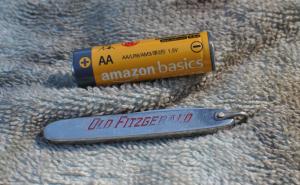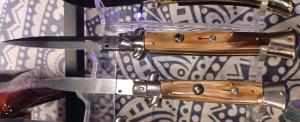Latama
LATAMA stands for Latin America Import Export Company and was founded by Jacob (Jack) Polinkovsky in the postwar years. Originally, the company dealt in silk exports to South America but eventually ventured into knife trading after Jack purchased British folding knives used in World War II and sold them in Venezuela for a profit. This led to the revival of the knife industry in Maniago, Italy, where Jack established LATAMA as one of the leading automatic knife manufacturers. The company started operations by exporting British "paratrooper" knives.
LATAMA faced the problem of sourcing high-quality steel in Northern Italy after World War II. Jack solved this issue by securing a supply agreement with Austrian company Boehler. LATAMA contracted with knife companies Coricama and Teja & Rosa Knifeworks in Maniago, and Romano Matsolli's Due Cigni brand, to produce scissors, small folding knives, and stilettos. Jack saw the popularity of automatic stilettos among American soldiers and teenagers and hired Patrizio Pasquale as supervisor in Maniago to manufacture different types of knives under the LATAMA brand. Abraham Abramovits was appointed as LATAMA's representative in Maniago to handle exports. Jack owned the brand stamps during the "golden age" of automatic stilettos in Italy.
LATAMA stilettos are known for their thick ejector and locking springs, attractive horn handle material, and high-quality blade materials and finishes. While the brand name itself contributes to its popularity, LATAMA also introduced various innovations and improvements to its knives during its 9 years of switchblade production. Despite the challenges in dating specific changes and determining the production timelines of certain models, it's clear that LATAMA was a leader in developing new technologies and products.

Latama Italy Old Fitzgerald Advertising Knife Mint 1950's 2 1/2" Closed Stainless Bail
Item # 105635
$11.50
For Sale By:
Scagel

Latama Italy Non Switchblade Gold Colored Mint Lobster 2 1/4" Closed Bail Mirror Polished
Item # 105632
$8.25
For Sale By:
Scagel

Latama flatguard picklock
Item # 110532
$420.00
For Sale By:
max milian

Vintage Latama? Automatic Hunter Folding Knife
Item # 107002
$400.00
For Sale By:
PocketknifeTherapy

LATAMA 11INCH PICKLOCK IN RAMS HORN (MINT CONDITION)
Item # 103621
$555.00
For Sale By:
Mercybrown

2013 MINT CONDITION 11INCH LATAMA SWIVEL BOLSTER IN BEAUTIFUL FRENCH TIP HORN AND FREE...
Item # 103106
$420.00
For Sale By:
Mercybrown

MINT 11INCH LATAMA SWIVEL BOLSTER AUTO WITH Choice Cocobolo wood pluss free Frank Beltrame swivel b
Item # 103072
$400.00
For Sale By:
Mercybrown

11"HONEY HORN LATAMA "PICKLOCK"
Item # 102677
$450.00
For Sale By:
snowball7

11inch Latama Picklock 5mm in raven horn ( firm price no offers please)
Item # 97670
$600.00
For Sale By:
Mercybrown

Latama Swinguard 28CM Briar Half Grind-- 5mm
Item # 92102
$575.00
For Sale By:
CJNknives

Latama Swinguard 28CM Zircote Half Grind-- 5mm
Item # 91945
$495.00
For Sale By:
CJNknives

CUSTOM 11"LATAMA WITH CANDYSTRIPE HANDLES WITH AN ONYX GEMSTONE PUSH BUTTON
Item # 91525
$800.00
For Sale By:
snowball7

LATAMA CUSTOM PICKLOCK WITH ABALONE
Item # 84859
$800.00
For Sale By:
Mercybrown

WALT'S CUSTOM CLASSIC LATAMA
Item # 84762
$600.00
For Sale By:
Mercybrown

WALTS CLASSIC CUSTOM LATAMA SWIVEL ABD FILE WORK
Item # 84758
$600.00
For Sale By:
Mercybrown

LATAMA 11INCH SWINGUARD WITH RAVEN HORN
Item # 84757
$400.00
For Sale By:
Mercybrown

Latama - Walt's 28cm CLASSIC “Camel Bone”
Item # 76049
$360.00
For Sale By:
CJNknives

